Overview
Alberta's economy remains strong, but some Albertans are impacted by inflation and the high cost of living.
To help, the Affordability Action Plan is taking quick, effective action through a package of relief measures that are cutting costs for all Albertans and businesses.
Find out how you benefit.
Energy affordability programs
Fuel tax relief, electricity rebate and natural gas program have been expanded to help more Albertans.
Fuel tax relief
Alberta drivers automatically save when oil prices are high.
Electricity rebates
Over 1.9 million homes, farms and businesses received rebates to cover high electricity costs.
Natural gas rebates
Rebates will protect Albertans from high heating costs if monthly rates go above $6.50/gigajoule.
-
Fuel tax relief
Alberta’s oil-price based fuel tax relief program saves Albertans some or all of the provincial fuel tax on gas and diesel when oil prices are high.
From April 1, 2024 to June 30, 2024, Alberta’s fuel tax will be 13 cents per litre.
How it works
- Fuel tax rates for gasoline and diesel are adjusted quarterly (January 1, April 1, July 1, October 1) based on the average price* of a barrel of West Texas Intermediate (WTI) oil:
- the fuel tax will be suspended whenever prices are at or above $90
- a partial fuel tax of 4.5 cents per litre will be applied whenever prices are $85 to $89.99
- a partial fuel tax of 9 cents per litre will be applied whenever prices are $80 to $84.99
- the fuel tax will be fully reinstated whenever prices fall below $80
- fuel tax rates cannot increase more than 9 cents per litre per quarter when oil prices fall
*The oil price average is based on the 20 trading days of WTI price data leading up to the 16th day of the month preceding the start of the next quarter.
Learn more about Alberta’s fuel tax relief program.
- Fuel tax rates for gasoline and diesel are adjusted quarterly (January 1, April 1, July 1, October 1) based on the average price* of a barrel of West Texas Intermediate (WTI) oil:
-
Electricity rebates
Electricity rebates were extended to April 2023. Rebates DO NOT have to be repaid.
Rebates were separate from the electricity price protection program, which deferred some costs over 21 months for consumers on the Regulated Rate Option (RRO).
How it worked
Many Albertans are facing high electricity bills. To help cover the costs, we provided $500 in rebates to over 1.9 million homes, farms, and small businesses from July 2022 to April 2023.
- Monthly rebates were applied directly to eligible electricity bills, for a total of $500
- $50 rebates on power bills from July to December 2022
- $75 rebates on power bills in January and February 2023
- $25 rebates on power bills in March and April 2023
- Rebates were applied each month and appeared as a credit on your bill listed under the "GOA Utility Commodity Rebate"
- Eligible consumers automatically received the rebate
Eligibility
- You were automatically eligible for the rebate if you are an electricity customer who:
- was connected to the system and received a monthly bill directly from a utility provider
- consumed less than 250 megawatt hours of electricity within the past year
- disconnected from the system for missed payment but were still enrolled with an electricity retailer
- You were not eligible for a rebate if you:
- disconnected from the system and were not enrolled with an electricity retailer
- didn't receive monthly bills directly from a utility provider because you lived in a sub-metered residence (some condos and apartments); only the main site that connects directly to the distribution system was eligible to receive the rebate, if it consumed less than 250 megawatt hours per year
- provided yard or street lighting services
- Monthly rebates were applied directly to eligible electricity bills, for a total of $500
-
Electricity price protection
Consumers on the Regulated Rate Option (RRO) were protected from record price spikes this past winter. Deferred costs from January to March will be spread out over 21 months to make bills more manageable. This does not apply to consumers who have signed a competitive (fixed rate) contract.
Many RRO and competitive contract consumers also received electricity rebates. Rebates DO NOT have to be repaid.
How it works
- Consumers on the RRO were not charged more than 13.5 cents per kilowatt hour in January, February and March 2023.
- Any costs above the 13.5 cent price ceiling have been deferred and will be repaid over 21 months from April 2023 to December 2024.
- The deferred costs will be added to the RRO rate during the 21-month period. It is projected to be about 2 to 4 cents per kilowatt-hour.
- We continue to monitor and review the RRO and our electricity system as part of our work to keep reliable electricity affordable for Albertans.
- There are currently 700,000 to 800,000 consumers on the RRO.
Tips!
- To save even more, find out if switching to a fixed rate is right for you. The current 13-month average is 7.83 cents/kWh.
- There is no requirement to switch to a fixed-rate contract. At any time, you can choose to remain on the RRO or explore another option that’s right for you.
- If you would like more information about the RRO or utility provider options, visit ucahelps.alberta.ca
-
Natural gas rebates
As part of the Affordability Action Plan, the Natural Gas Rebate program, which has been in place since October 2022, has been expanded to provide year-round price protection.
Current rebate rate
To help Albertans manage higher heating costs due to volatile natural gas prices, we've put in place an energy rebate program to shield consumers from price spikes.
Most Albertans will receive the rebates automatically on their utility bill, but a small number of people not connected to the natural gas system or using other heating fuels will need to apply.
- Highest default monthly natural gas rate (the Alberta price) for April 2024: $1.966 per gigajoule.
- No rebate will be credited for the April billing period but price protection is in place and rebates will be offered if the monthly rate rises above $6.50/gigajoule.
How it works
- Rebates will be applied directly to all eligible consumers' utility bill if the regulated monthly natural gas rate charged by any one of Alberta's 3 regulated utility providers is above $6.50 per gigajoule.
- Each month we will post the highest price default natural gas rate (the Alberta price) from the 3 regulated utility providers (ATCO North, ATCO South, and APEX Utilities).
- If the published Alberta price is above $6.50 per gigajoule, rebates will cover the difference between $6.50 per gigajoule and the regulated rate that calendar month. For example, if the Alberta price is $7.50, eligible consumers would get a rebate on their bill covering $1 for every gigajoule used.
- Exact timing of the rebates will vary depending on your billing cycle.
Eligibility
- You will automatically receive the rebate on your utility bill if you are a natural gas consumer who:
- is connected to the system
- is on either a regulated or competitive plan
- uses less than 2,500 gigajoules of natural gas annually
- You can receive a rebate if your household, small apartment building, farm, or small industrial or commercial operation is not connected to the natural gas system or uses other heating fuels under the maximum limit:
- Propane: 16,334 litres per month, to a maximum of 97,925 litres per year
- Heating oil: 10,780 litres per month, to a maximum of 64,625 litres per year
- Kerosene: 11,068 litres per month, to a maximum of 66,350 litres per year
- Non-connected natural gas: 417 gigajoules per month, to a maximum of 2,500 gigajoules per year
- Information on rebate application process for non-connected consumers and those using petroleum-based heating fuels will be available in advance of the application period (between April 15 and May 15 of each year).
- During this time, eligible consumers may apply for rebates on these other heating fuels for those months between April 1 and March 31 preceding the application period that the Alberta Price exceeded $6.50 per gigajoule for connected fuel.
Watch out for scams
- The Government of Alberta will not send texts or emails about the rebate program and will not ask Albertans to submit information to receive rebates.
-
Get help
Questions about your bill
- Contact the Utilities Consumer Advocate at 310-4822 or email [email protected] for support if you believe you meet the eligibility criteria, but did not get a rebate on your natural gas bill.
- Assistance information for consumers who are not connected to the natural gas system or consume other eligible heating fuels will be listed when the program starts.
Utility costs
- Visit UCA Helps for tips to lower your utility costs and save money.
Phishing scams
- The Government of Alberta will not send texts or emails about the rebate program and will not ask Albertans to submit information to receive rebates.
- Be wary of any emails or texts related to the rebates that seem suspicious or ask for personal information.
Financial assistance
- If you're experiencing financial difficulty, programs are available:
- Seniors Special Needs Assistance Program provides utility arrears coverage once every 3 years
- Direct to Tenant Rent Supplement Program assists eligible applicants with rental costs
- Alberta Supports provides an emergency-needs allowance and one-time utility assistance with disconnection notices
-
 Want lower utility bills?
Want lower utility bills?The Utilities Consumer Advocate can help you understand your bill, offer tips to reduce energy, and find ways to save.
Affordability payments
Between January and June, 2023, seniors, families with children under 18, and Albertans on benefit programs were able to apply to get up to $600 in financial support to help with the elevated cost of living. Learn more
Seniors
Seniors 65 and older applied to get $600.
Families with children
Families applied to get up to $600 for each child under 18.
Albertans on core supports
AISH, PDD, CPP Disability, Income Support and Seniors Benefit clients automatically got $600.
Help for vulnerable Albertans
The Affordability Action Plan includes measures to help Albertans with their daily living costs.
Financial benefit increases
AISH, Income Support, seniors and child benefit payments went up 6% in 2023 and will be indexed to keep up with inflation.
Low-income transit passes
Helping more Albertans in need get where they need to go for less.
Food bank funding
Helping food banks put nutritious food on more tables by providing $20 million in funding over 2 years.
-
AISH benefits increase
We increased monthly benefits for Albertans with disabilities to help with the high cost of living.
How it worked
- In 2023, AISH benefits went up 6%.
- In future years, benefits will be indexed to inflation. This means the amount will change each year so it keeps up with the cost of living.
New monthly rates
Monthly payments vary depending on your needs and family size. The examples below are the maximum monthly core benefit. Supplementary benefits also went up 6% and will be indexed for inflation.
- Core benefits
- $1,787 – Living allowance
- $342 – Modified living allowance for those in an approved nursing home, auxiliary hospital or designated supportive living facility
- Child benefits
- $212 – First dependent child
- $106 – Each additional dependent child
Need help?
- If you get AISH benefits, call your caseworker or local office.
- For all other questions, call the Alberta Supports Contact Centre at 1-877-644-9992.
-
Income Support benefit increase
We increased monthly benefits for Albertans out of work to help with the high cost of living.
How it worked
- In 2023, Income Support benefits went up 6%.
- In future years, benefits will be indexed to inflation. This means the amount will change each year so it keeps up with the cost of living.
New monthly rates
Monthly payments vary depending on your needs and family size. The examples below are the maximum monthly core benefit. Supplementary benefits also went up 6% and will be indexed for inflation.
Table 1: Expected to Work Clients
Household composition Core essential benefit Core shelter benefit (private housing) Single adult $440 $350 Single adult, 1 child $652 $592 Single adult, 2 children $758 $613 Couple, no children $711 $473 Couple, 1 child $923 $624 Couple, 2 children $1,029 $645 Table 2: Barriers to Full Employment Clients
Household composition Core essential benefit Core shelter benefit (private housing) Single adult $569 $350 Single adult, 1 child $781 $592 Single adult, 2 children $887 $613 Couple, no children $903 $473 Couple, 1 child $1,115 $624 Couple, 2 children $1,221 $645 Need help?
- If you get Income Support benefits, call your caseworker or local office.
- For all other questions, call the Alberta Supports Contact Centre at 1-877-644-9992.
-
Alberta Seniors Benefit increase
We increased monthly benefits for seniors to help with the high cost of living.
How it worked
- In 2023, Alberta Seniors Benefit went up 6%.
- In future years, benefits will be indexed to inflation. This means the amount will change each year so it keeps up with the cost of living.
New monthly rates
- $303, up from $286
Need help?
- Call the Alberta Supports Contact Centre at 1-877-644-9992.
-
Alberta Child and Family Benefit increase
We are increased benefits for families with children to help with the high cost of living.
How it works
- In 2023, Alberta Child and Family Benefit payments went up 6%.
- In future years, payments will be indexed to inflation. This means the amount will change each year so it keeps up with the cost of living.
New annual rates
Annual Alberta Child and Family Benefit amounts, paid quarterly, vary depending on family size. The examples below are the maximum benefit per family.
- $2,132 up from $2,011 for families with one child
- $3,494 up from $3,296 for families with 2 children
- $4,592 up from $4,332 for families with 3 children
- $5,427 up from $5,120 for families with 4 children
Need help?
- Call the Alberta Supports Contact Centre at 1-877-644-9992.
-
Low-income transit passes
We expanded funding for low-income transit passes to help more Albertans in need get where they need to go without breaking the bank. The funding allows communities to offer monthly bus passes to low-income residents at subsidized rates.
What we are doing
- Investing $15 million in new funding to help:
- Calgary and Edmonton provide their low-income transit programs throughout the year ($4.5M each)
- Expand funding to more municipalities across the province
- Details on how to access this funding will be shared directly with eligible municipalities.
How residents can get a low-income transit pass
- Eligibility and subsidy levels are set by each community.
- If you live in a community that offers low-income transit passes, contact your local municipality to find out if you are eligible, the cost, and how to get a pass.
News
- Expanding transit access for low-income Albertans (September 26, 2023)
- Helping Albertans in need get from point A to B (February 2, 2023)
- Investing $15 million in new funding to help:
-
Food bank funding
The elevated cost of food is making it harder for Albertans to provide for themselves and their families. Many people are turning to food banks for help.
What we're doing
We are helping local food banks and organizations put nutritious meals on more tables by providing $20 million in funding over 2 years.
- $10 million each year will be distributed to food banks through the Family and Community Support Services Association of Alberta. In 2022-23:
- $2.8 million was provided to established food banks in December 2022 to purchase and transport food, and help pay for front line staff.
- $2.9 million was provided to eligible civil society organizations through the Food Security Grant.
- $3.4 million was provided to match donations received by food banks and related civil society organizations from December 1 to December 31, 2022 through the donation matching grant.
- Food Bank Alberta received $510,000 to help strengthen Alberta’s network of food banks.
- The remaining funding was provided to Family and Community Support Services Association of Alberta to administer the grants.
- See the Food Banks and Food Security Grant Recipient List 2022-23.
- We recognize that our community partners are in the best position to identify and understand local needs.
- Funding provided to each food bank is based on the service area and the number of individuals served.
- Food banks receiving funding were identified based on their participation in Food Banks Canada 2022 Hunger Count.
- More information on upcoming grants will be available later this year.
Need help?
- To find a food bank or charity in your area, call or visit 211 Alberta.
- $10 million each year will be distributed to food banks through the Family and Community Support Services Association of Alberta. In 2022-23:
Help for workers and drivers
Income tax relief, affordable child care and auto insurance measures to help working Albertans.
Income tax relief
All working Albertans can earn more before they start paying provincial income taxes.
Child care
Alberta families have more options for affordable child care.
Auto insurance
Alberta drivers will get some relief from insurance rate and payment plan changes.
-
Indexing personal income taxes
Many Albertans received a higher refund or owed less tax in 2022, and will benefit from lower tax deductions on the paycheques in 2023.
- Basic personal amounts, other credit amounts and income thresholds will be indexed to inflation.
- Annual basic personal amounts are expected to go up:
- 6% in 2023, an increase from $19,814 to $21,003
- Around 1.3 million tax filers don't pay any provincial income tax. Nearly 95,000 more Albertans won't have to pay by 2023.
-
Making child care more affordable and accessible
We are helping to make child care more affordable and accessible for families by reducing child care fees, increasing subsidy eligibility, and creating thousands more child care spaces as part of the made-in-Alberta child care agreement we successfully negotiated with the federal government.
Reducing fees
- Licensed child care programs and operators are eligible for affordability grants so they can:
- reduce parent fees for all kids 0 to kindergarten age by half
- lower average child care fees to $10 per day by 2026
Expanding child care subsidy eligibility
- Families with household incomes under $180,000 can now reduce their fees even more by applying for child care subsidy if they have children 0 to kindergarten age attending full-time licensed child care or preschool.
Creating more child care spaces
- We're helping parents access the flexible and high-quality child care options that work best for them by:
- supporting high-quality licensed child care - preschools, daycare and family day homes under a licensed agency
- creating 42,500 new non-profit child care spaces by 2026
- creating 22,500 new private spaces by 2026 under the new Cost Control Framework and For-Profit Expansion Plan
- ensuring flexibility for families requiring drop-in or overnight child care
- supporting children with specific learning, linguistic, cultural and other needs
Learn more about the federal-provincial child care agreement
- Licensed child care programs and operators are eligible for affordability grants so they can:
-
Taking action on auto insurance
We are taking action to help make auto insurance more affordable for Alberta drivers.
Rate increase pause
- Pausing insurance rate increases on private passenger vehicles until the end of 2023. This means:
- No new insurance rate increases will be approved for the remainder of 2023.
- Some drivers may still see rate increases on their renewals in 2023 due to:
- previously approved rate changes
- changes to driving records, including at-fault claims or tickets
- changes to insurance profiles such as a new address or different vehicle
Payment plans
- Requiring insurance companies to provide most Albertans with an option to pay premiums through payment plans rather than annually.
Consumer tips
- Shop around or work with your insurance company to get the best rate.
- Bundle your vehicle, home or property insurance to save up to 20%.
- Be a good driver to get discounts.
- Pausing insurance rate increases on private passenger vehicles until the end of 2023. This means:
Help for post-secondary students
Tuition and financial assistance measures to ensure post-secondary education is accessible and affordable.
Tuition
Providing stable, predictable tuition to keep post-secondary education affordable.
Student loans
Helping more Alberta students pay less for their student loans.
Alberta Student Grant
Top-up payments to help more low-income Alberta students.
-
Capping tuition increases
We are helping to make tuition costs more predictable and affordable by capping domestic tuition increases at public post-secondary institutions (other than the Banff Centre) in 2024/25 and for future academic years.
- 2% cap on tuition increases at the institutional level beginning in the 2024/25 academic year for domestic students.
- Keeping a small increase in tuition fees allows post-secondary institutions to maintain the quality of programming and services provided to students year after year.
- Alberta tuition remains comparable to the national average.
-
Reducing interest rates on Alberta Student Loans
We are helping to reduce the cost of borrowing for both current and future Alberta Student Loan borrowers by lowering interest rates:
- Variable rate = prime (down from prime + 1%)
- Fixed rate = prime (down from prime + 2%)
How it works
- About 164,000 current Alberta Student Loan borrowers and all future borrowers will benefit from interest rates lowered to the prime rate, beginning July 1, 2023.
- A small number of current borrowers with fixed interest rates will remain at their current fixed rate.
-
Extending Alberta Student Loan interest-free grace period
We are increasing the Alberta Student Loan interest-free grace period to give students more time to find a good job without having to worry about student loan payments.
- Interest-free grace period will double from 6 months to 12 months after graduation.
- Changes will be effective July 1, 2023 and will benefit students who have completed studies after December 1, 2022.
- About 57,000 post-secondary students who are expected to graduate each year will benefit from the extended grace period.
- Alberta, along with Prince Edward Island, now leads the country in exceeding the grace periods offered by all other provinces and the federal government.
-
Increasing thresholds for the Repayment Assistance Plan
We are increasing the income thresholds for the Repayment Assistance Plan so more students with Alberta Student Loans can benefit from the program.
- Income threshold increases from $25,000 to $40,000, effective July 1, 2023.
- The plan calculates an affordable monthly payment based on family income and family size.
- Repayment assistance terms are for 6 months. Students must reapply every 6 months if they still need help.
- All student loan borrowers continue to have access to flexible repayment options including:
- a payment plan that fits with the student’s life and financial goals
- adjusting the terms of a loan to decrease or increase payments as needed
-
Increasing the Alberta Student Grant
We are making immediate changes to the Alberta Student Grant by providing additional top-up funding to more than 10,000 low-income students.
How it works
- Students eligible for the Alberta Student Grant will receive $475 per month for any programs with a start date between August 1, 2022 and July 31, 2023, and have up to 30 days before the end of their program to apply.
- Current grant recipients will receive a total of $475 per month in grant funding:
- $250 per month in regular grant funding
- $225 per month in additional top-up funding for the 2022-23 school year
- New grant applicants will receive:
- $475 per month in funding
-
 Lower overall taxes
Lower overall taxesAlbertans pay less in overall taxes with no PST, no payroll tax or health premium, as well as a low provincial income tax indexed for inflation that about 40% of Alberta tax filers don't pay. A couple earning $75,000 with 2 children would pay $1,500 more in B.C. and $3,900 more in Ontario.
-
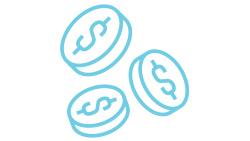 Albertans earn more
Albertans earn moreAlberta workers have the highest weekly earnings ($1,226) in the country, while households have the highest median after-tax income ($104,000), which is $7,000 higher than Ontario and $10,000 higher than BC.
-
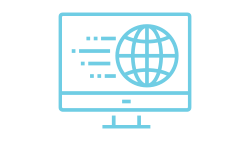 Affordable broadband for all
Affordable broadband for allThe Alberta Broadband Strategy will bring affordable, reliable, high-speed internet to rural Albertans across the province over the next 4 years.
-
 Supporting students
Supporting studentsThe New Beginnings Bursary provides $5,000 to low-income students studying in high-demand programs to help pay for tuition, fees, supplies and living costs. This financial support does not need to be repaid.
-
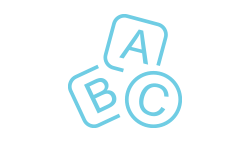 Affordable child care
Affordable child careFamilies of children 0 to kindergarten-age earning up to $180,000 are now eligible for subsidy to lower child care costs. By 2026, all families will pay an average of $10 per day and 42,500 new licensed spaces will be added so families can choose the care that works for them.
-
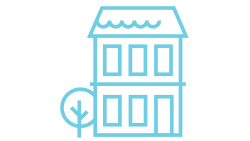 Housing is affordable
Housing is affordableAlberta has some of the lowest housing prices and rental costs among Canadian urban centres. A smaller share of income is spent on home ownership costs – 31% in Edmonton and 42% in Calgary vs. the Canadian average of 63%.
-
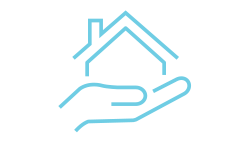 Rent assistance
Rent assistanceThe Temporary Rent Assistance Benefit helps eligible tenants who are low income or between jobs afford their rent while they stabilize or improve their situation.
-
 Affordable school transportation
Affordable school transportationThe Fuel Price Contingency Program will remain in place for the 2022-23 school year to help school authorities cover higher transportation costs, providing millions of dollars in additional student transportation funding.
News
March 31, 2023
Inflation relief for Albertans with disabilities
Alberta’s government is providing affordability relief payments to 25,000 additional Albertans living with a disability.
February 9, 2023
1 million Albertans to receive affordability payments
More than one million Albertans are enrolled and scheduled to receive their first of six $100 affordability payments, representing $96 million in inflation relief.
January 17, 2023
Affordability payment portal opens January 18
Beginning January 18 at 9 a.m., eligible Alberta parents and seniors can apply to receive $600 in affordability payments over six months.